1. Neutral type 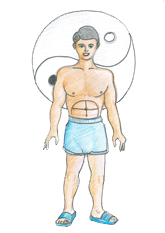
The key features of this type are normal physique, glowing complexion and energetic. Individuals have a good congenital foundation, and their body is well function physically and mentally. Such people are the healthiest among other types, however keeping good lifestyles such as a widely-selected diet, regular exercise and getting enough sleep are still important for them to stay healthy.
It should be noted that long-term improper eating habits will alert the body to a less balanced state that should be avoided. For example, hot and heavily spicy foods tend to shift the body to a damp-heat or yin deficiency constitution; too much cold, raw and frozen foods exhaust yang qi and disturb blood circulation that can make the body shift to a yang deficiency or blood stasis constitution; over-eating and too much nutrition will lead to a phlegm & dampness constitution; ill-balanced feeding or dieting will lead to malnutrition that forms a qi deficiency or yang deficiency constitution. Last but not least, high-salt diet is a major cause in developing the phlegm & dampness and blood stasis constitutions.
2. Qi deficient type 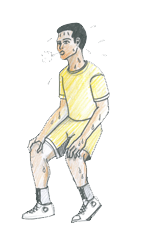
The key features of this type are fatigue, breath shortness, and sweating. TCM claims that individuals are inefficient in the production of qi (vital energy) that leads to a weak gas exchange in the lungs or under-functioning in other organs. They need to promote the qi production and enhance immune functioning. Also they should be more attentively to protect the body, such as keeping warm, avoiding physical and mental overstrain.
Qi deficient individuals should eat more foods that help invigorate the spleen and stomach so as to promote qi production, suggested foods are cereals, grains, Chinese yam, dates, carrot, mushrooms, bean curd, taro, sweet potato, potato, pumpkin, peas, soybean, apple, cherry, chestnut, grapes, lotus seed, Chinese wolfberry, longan aril, Gorgon fruit, poria, beef, fish, goose, chicken, rabbit, quail, and honey. Individuals tend to have a weak digestive system, so the diet should be light and easily digested. Ingredients such as citrus fruits, onion, garlic, leaf mustard, coriander, pepper, peppermint, tea, alcohol and cigarette can further consume qi, and should be taken in moderation.
3. Yang deficient type 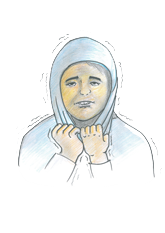
The key feature of this type is cold signs such as sensitive to low temperatures and cold limbs. TCM claims that individuals are insufficient in producing heat energy, they need to invigorate the body systems especially the liver and kidney to produce more heat. Also they should be more attentively to protect the body, through measures like proper warm clothing for the waist, abdomen and lower body, moderate outdoor activities, avoiding over perspiration and keeping the living room warm and dry. Cupping, moxibustion and acupressurehelp promote the meridian flow and expel coldness, and are beneficial for this type of individuals.
Yang deficient individuals should eat more warming foods, including beef, mutton, venison, quail, sea cucumber, shrimps, eels, nuts, ginger, Chinese chives, leaf mustard, peppers, leeks, cherry, litchi, longan fruit, raspberry, pumpkin, and spicy herbs. Foods in cool or cold energy such as crab, persimmon, and melons are not advised. Even in summer days, raw and frozen foods as well as cold drinks should be taken in moderation. It is advised to take some medicinal dishes in winter.
4. Yin deficient type 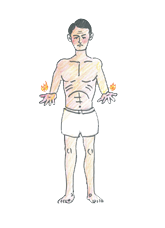
The key feature of this type is heat and dry signs such as mouth dryness, warm palms and soles. TCM claims that individuals are lack of body fluids, and need to moisten and cool the body properly. Moreover, fundamental substances like blood and essence are the major components of the body's yin, it is necessary for them to invigorate the internal organs to produce the substances more efficiently. On the other hand, individuals should be more attentively to protect the body and to prevent excessive yin consumption, activities like poor sleeping or staying overnight, busy working schedule, intensive exercise, thermal yoga, sauna or steaming can further deplete the body’s yin, and should be avoided.
Yin deficient individuals should cut back on heavily spiced, deep fried or roasted foods, and eat more nourishing and lubricating foods, such as pear, apple, pomegranate, peach, lotus root, wolfberry, mulberry fruit, lily bulb, sesame, glutinous rice, mushroom, honey, daily products, bean curb, white fungus, egg, sea cucumber, mussel, abalone, fishes, cuttlefish, sea conch, black chicken, rabbit, duck meat and pig skin. Some cooling foods can make them feel better such as celery, melons, lettuce, tomato, chrysanthemum, mung bean, bean sprouts and millet. The daily diet should be light and easily digested, and contain more fluid. It is beneficial to drink water, fruit juices and soups regularly.
5. Phlegm & dampness type 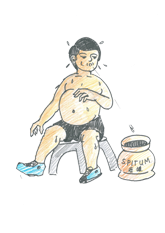
The key features of this type are overweight with tummy, sticky mouth and greasy tongue coating. TCM claims that individuals have a sluggishly metabolism that may be related to weak lung, spleen or kidney system. They need to promote the overall metabolism of the body, especially the fluid transforming processes. Other beneficial measures are losing weight, quitting cigarette and alcohol, regular exercise, more outdoor activities, wearing light loose clothing to keep the body dry, and keeping the living environment dry and ventilated. Methods such as cupping, moxibustion and herbal dressing can promote the meridian flow and help dispel dampness and phlegm out of the body, and are suitable for them.
Phlegm and dampness individuals should eat more foods that help prevent the accumulation of dampness and phlegm inside the body, such as celery, cabbage, Chinese radish, kelp, sea laver, jellyfish, loquat fruit, ginkgo nut, hyacinth bean, coix seed, onion, red rice bean, wax ground, cucumber, loofah, water chestnut, bamboo shoot, clam, lotus leaf, olive, poria, Gorgon fruit, Chinese yam, carrot, lotus seed and red dates. A light and easily digested diet ensures the spleen and stomach to work more effectively. Individuals should not eat too full, and limit the amount of greasy, fatty, and sweet foods.
6. Damp-heat type 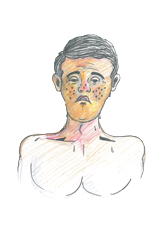
The key features of this type are oily face, bitter taste in mouth, yellow and greasy tongue coating. TCM claims that individuals have a relatively high metabolism but accumulated too much metabolic wastes inside the body, leading to various heat signs. They need to cool down the body and prevent further accumulation of metabolic wastes. A healthy living is very important for clearing the damp-heat, individuals should get plenty of sleep, maintain regular bowel habits, avoid alcohol and smoking, do more intensive exercise, and keep the living environment dry and ventilated. Methods like scraping, cupping, moxibustion and herbal dressing can eliminate damp-heat out of the body, and are suitable for them.
Damp-heat individuals should choose light and easily digested foods. It is advised to eat more foods that promote the body to eliminate damp-heat pathogens, such as celery, cucumber, hyacinth bean, red rice bean, bitter gourd, wax gourd, loofah, bok choy, amaranth, cabbage, wild rice stem, lotus root, tomato, water chestnut, loquat fruit, water melon, banana, bean sprouts, mung bean, poria, purslane, coix seed, kelp, duck meat, carp and lotus seed. They are not advised to eat heavily spiced, deep fried or roasted foods, and warm or hot energy foods like mutton, ginger, pepper, chili pepper and garlic should also be limited. It is better to seek professional opinion before taking any herbal supplement.
7. Blood stasis type 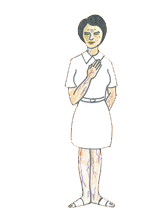
The key feature of this type is sluggish flow signs such as dull complexion and dark-red lips. TCM claims that individuals tend to have inefficient blood circulation, and may even develop blood stagnation in some regions of the body. Individuals need to activate blood and qi, and unblock the meridian system, so as to improve the overall circulation. Methods like scraping, acupuncture, cupping and soaking feet can activate the blood flow, and thus suitable for them. It is also necessary for them to balance between work and rest, and be more physically active.
Blood stasis individuals should eat more foods that help activate and nourish blood, resolve stasis, regulate qi and smooth the flow of meridians, suggested foods include black soy bean, kelp, sea laver, seaweed, Chinese radish, carrot, hawthorn fruit, citrus fruits, peach, plum, mango, onion, celery, eggplant, papaya, black fungus, mushrooms, lotus leaf, peach kernel, rosebud, green tea, vinegar, brown sugar, and red wine. On the other hand, greasy, frozen and stimulating foods tend to aggravate blood stasis, and should be limited in consumption.
8. Qi stagnation type 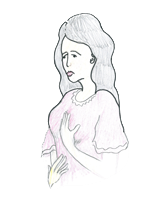
The key feature of this type is emotional distress, for example a depressed mood, or being nervous or anxious, that TCM claims to be associated with a weak liver. In TCM, the liver regulates qi movements and balances emotions. When individuals are under stress, it can easily disturb the liver’s regulatory functions and then affects qi activities inside the body. Emotional management strategies are important for individuals, such as adjusting attitude, being more socially active, spending more time in outdoor activities, have some hobbies, keeping a comfort and quiet living environment, learning relaxation techniques, and exercising regularly. For the physical body, it is necessary to rectify the qi flow and relive the body tension.
Qi stagnation individuals should eat more foods that help promote qi flow and soothe the liver, including citrus fruits, buckwheat, wheat, barley, Chinese chives, day lily, kelp, seaweed, Chinese radish, hawthorn fruit, onion, garlic, rosebud, chrysanthemum, peppermint, and tangerine peel. Stimulants such as tea and coffee should be avoided before going to bed. It is advised to take supplements with caution.
9. Special constitution type
The key feature of this type is an atopic constitution that makes individuals very sensitive to drugs, foods, smells, pollens or other seasonal triggers. TCM claims that they need to enhance the body resistance again external stimulants, in order to prevent attacks or reduce the severity of symptoms. It is necessary to have a balanced lifestyle that can manage both physical and emotional aspects. They should also modify their living according to seasonal changes. For example, individuals have to stay indoor to avoid pollen affection in spring, and also keep their living environments clean and ventilated in summer.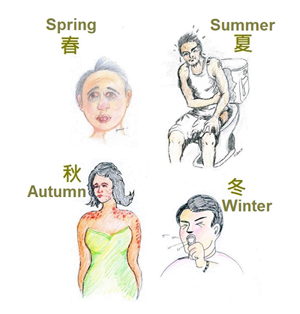
Special constitution individuals should maintain a light and balanced diet, and drink plenty of water. They should avoid eating something that are known to cause allergies. Also, frozen and raw foods are not recommended. It is better to cut back on foods such as buckwheat, broad bean, hyacinth bean, high-protein foods, alcohol, chili pepper, coffee and tea, as TCM holds that they are common triggers for some diseases.
Ingredients that can replenish qi, enhance immunity, cool blood, dispel wind, and invigorate the spleen, lung and kidney organs are beneficial to them. Foods in cold and cool energies such as mung bean, wax ground and lotus seed can help ease the discomforts during attacks. If necessary, individuals can take supplements or special dishes to enhance the overall status of the body. Below are some healthy recipes:
※ Allergic rhinitis
Ingredients : rice (100g), red dates (10 pieces, stone removed), chicken (100g, bone attached), ginger (10g), coriander (10g) and green onion (10g);
Preparing method : bring 1000ml of water to a boil, add in the rice, chicken (chopped) and ginger (sliced), simmer under low heat for about 45 minutes or until the liquid turn thick, sprinkle on the coriander and green onion. Serve warm with an empty stomach;
Health benefits : this congee enhances the lung functioning and relieves signs like nasal congestion, sneezing and runny nose.
※ Asthma
Ingredients: Chinese almond or apricot kernels (50g), glutinous rice (20g) and rock sugar (30g);
Preparing method : soak the kernels and rice, grind them with water and finally strain out the juice. Pour the juice into a pot, cook it over medium to low heat and stir occasionally. Add in the rock sugar and some more water, and simmer until dissolved. Serve warm with an empty stomach;
Health benefits : the Chinese almond tea nourishes the lungs, soothes the airways, dissolves sputum and arrests cough.
※ Skin rashes
Ingredients : one bitter gourd (frozen), 2 pears, and 1 tablespoons of honey (or add as you prefer);
Preparing method : wash the bitter gourd and pears; remove the seeds of bitter gourd and cut it into pieces; peel the pears, remove the core and cut into pieces; put them into the juicer and add in 500ml of water, skim off the juice foam carefully, add in the honey and mix up properly. Drink in the morning and evening;
Health benefits : this juice clears heat, detoxifies the body, and soothes the skin.
※ Spastic colitis
Ingredients : ginseng (9g), poria (10g), cardamon seed (9g), roasted liquorice root (5g), lotus seed (15g) and rice (100g) ;
Preparing method : Decoct the first four herbal ingredients with 1000ml of water, cook over high heat to make a concentrated herbal solution. Then use the solution, lotus seed and rice to make a congee. Eat warm in the morning and evening for 15 days;
Health benefits : this congee enhances the bowel movements, regulates the digestive process and arrests diarrhea.











